大学英语课程导学模式探究——以秦秀白主编的《新世纪大学英语》教材为例
秦秀白《新世纪大学英语综合教程(4)》(课文精解 Unit 3)【圣才出品】
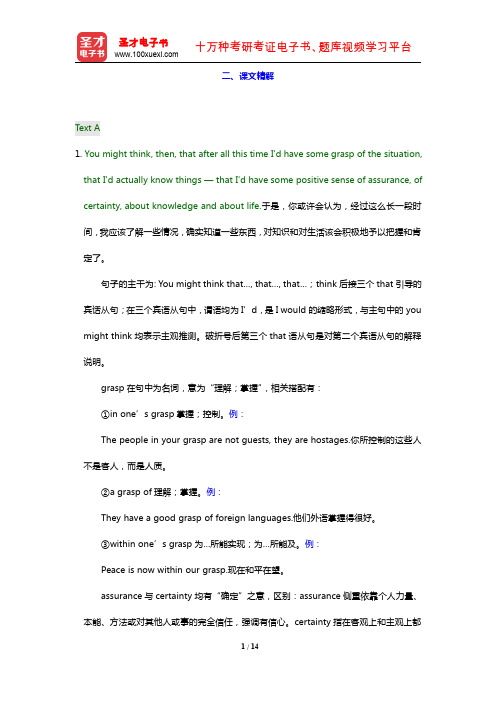
二、课文精解Text A1.You might think,then,that after all this time I'd have some grasp of the situation, that I'd actually know things—that I'd have some positive sense of assurance,of certainty,about knowledge and about life.于是,你或许会认为,经过这么长一段时间,我应该了解一些情况,确实知道一些东西,对知识和对生活该会积极地予以把握和肯定了。
句子的主干为:You might think that…,that…,that…;think后接三个that引导的宾话从句;在三个宾语从句中,谓语均为I’d,是I would的缩略形式,与主句中的you might think均表示主观推测。
破折号后第三个that语从句是对第二个宾语从句的解释说明。
grasp在句中为名词,意为“理解;掌握”,相关搭配有:①in one’s grasp掌握;控制。
例:The people in your grasp are not guests,they are hostages.你所控制的这些人不是客人,而是人质。
②a grasp of理解;掌握。
例:They have a good grasp of foreign languages.他们外语掌握得很好。
③within one’s grasp为…所能实现;为…所能及。
例:Peace is now within our grasp.现在和平在望。
assurance与certainty均有“确定”之意,区别:assurance侧重依靠个人力量、本能、方法或对其他人或事的完全信任,强调有信心。
certainty指在客观上和主观上都无一丝一毫的怀疑。
新世纪大学英语第二版综合教程一课文译文主编秦秀白-蒋静仪
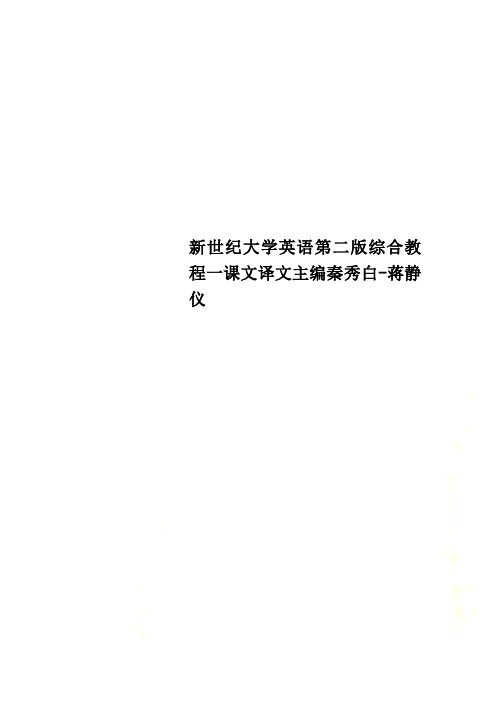
新世纪大学英语第二版综合教程一课文译文主编秦秀白-蒋静仪优等生的秘诀1 一位研究教育的老师针对成绩优异的学生做过重点研究,发现最聪明的学生不见得总能得高分。
根据这位教授、其他教育专家以及优等生们自己的观点,懂得如何充分发挥自己的潜能对于学生来说更为重要。
2 在班上名列前茅的学生之所以学习优秀,是因为他们掌握了几个人人都可以轻易学到的基本原则。
首先,优等生知道如何决定轻重缓急。
他们从来不会为了打电话、看电视或者吃零食而牺牲学习时间。
换言之,学习总是摆在娱乐之前。
另外,优等生们总是注意随时随地学习。
有位成绩优异的学生同时也是优秀的运动员,每天利用户外训练时间背生物学术语。
而另一位学生则利用每天早上刷牙时间记一个新单词。
所有受访的学生无一例外都认为,在什么时间学习完全是个人偏好问题。
有些人在夜深人静时学习效果最好,有些人则喜欢趁着自己还能清晰地记得上课所讲的内容,一放学回家就开始学习。
尽管如此,所有优等生都一致认为,如果想任何时候都表现优秀,一个主要的因素就是要持之以恒。
3 学生还必须学会有条理。
举个例子,有一位优等生在学校乐队、田径队、橄榄球协会和辩论小组里都很活跃。
他透露,他之所以把东西放得井井有条是因为他浪费不起到处找东西的时间。
还有一位学生喜欢把当天的笔记马上整理出来并放进用不同颜色标记的文件夹里,以便临近考试时能随时用来复习。
优等生们提倡的另一个技巧是有效的阅读,其中包括快速阅读,提高记忆能力以及主动提出问题以便充分理解作者的意思。
4 对于学生们来说,合理安排时间也同样重要。
他们必须懂得如何根据每天的时间表和学习能力来安排做作业和项目的速度,不至于让手头的工作压得喘不过气。
能制定时间表不仅让学生能够腾出更多时间来复习和完善功课,而且还能防止他们拖拖拉拉。
成绩优异的学生认为,他们成功的一大秘诀就是上课时做好笔记,供复习时使用。
有个学生透露,她把从课文上摘抄的内容记在笔记本的一边,把课堂笔记写在另一边。
秦秀白《新世纪大学英语综合教程(4)》(课文精解 Unit 1)【圣才出品】
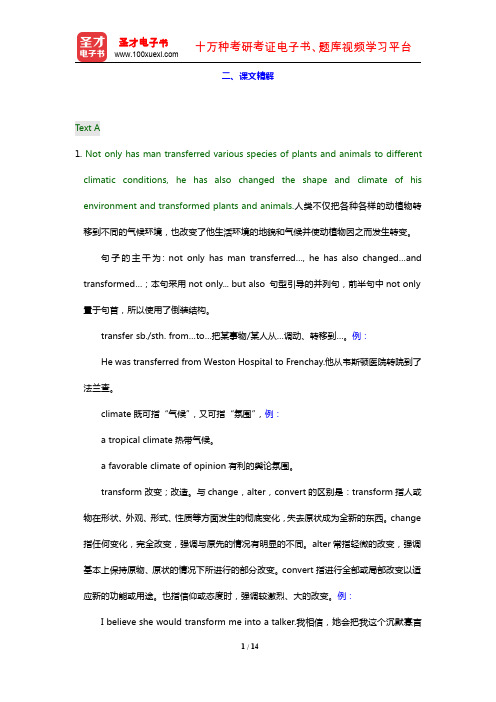
二、课文精解Text A1.Not only has man transferred various species of plants and animals to different climatic conditions,he has also changed the shape and climate of his environment and transformed plants and animals.人类不仅把各种各样的动植物转移到不同的气候环境,也改变了他生活环境的地貌和气候并使动植物因之而发生转变。
句子的主干为:not only has man transferred…,he has also changed…and transformed…;本句采用not only...but also句型引导的并列句,前半句中not only 置于句首,所以使用了倒装结构。
transfer sb./sth.from…to…把某事物/某人从…调动、转移到…。
例:He was transferred from Weston Hospital to Frenchay.他从韦斯顿医院转院到了法兰查。
climate既可指“气候”,又可指“氛围”,例:a tropical climate热带气候。
a favorable climate of opinion有利的舆论氛围。
transform改变;改造。
与change,alter,convert的区别是:transform指人或物在形状、外观、形式、性质等方面发生的彻底变化,失去原状成为全新的东西。
change 指任何变化,完全改变,强调与原先的情况有明显的不同。
alter常指轻微的改变,强调基本上保持原物、原状的情况下所进行的部分改变。
convert指进行全部或局部改变以适应新的功能或用途。
也指信仰或态度时,强调较激烈、大的改变。
例:I believe she would transform me into a talker.我相信,她会把我这个沉默寡言的人变成个碎嘴子。
大学英语教学中隐性课程的开发和利用
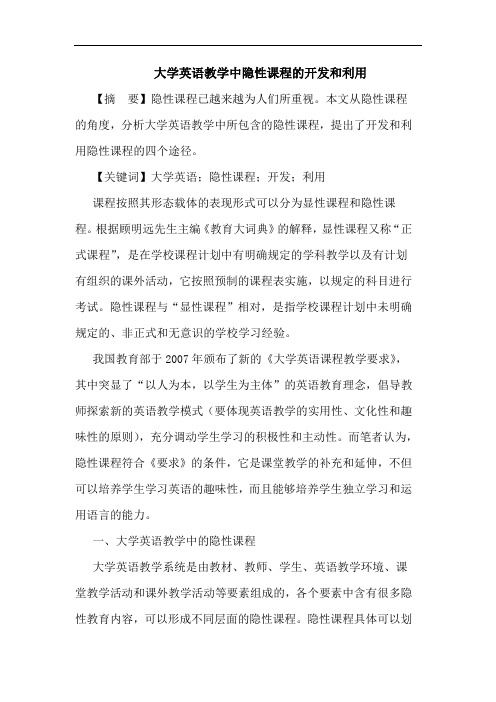
大学英语教学中隐性课程的开发和利用【摘要】隐性课程已越来越为人们所重视。
本文从隐性课程的角度,分析大学英语教学中所包含的隐性课程,提出了开发和利用隐性课程的四个途径。
【关键词】大学英语;隐性课程;开发;利用课程按照其形态载体的表现形式可以分为显性课程和隐性课程。
根据顾明远先生主编《教育大词典》的解释,显性课程又称“正式课程”,是在学校课程计划中有明确规定的学科教学以及有计划有组织的课外活动,它按照预制的课程表实施,以规定的科目进行考试。
隐性课程与“显性课程”相对,是指学校课程计划中未明确规定的、非正式和无意识的学校学习经验。
我国教育部于2007年颁布了新的《大学英语课程教学要求》,其中突显了“以人为本,以学生为主体”的英语教育理念,倡导教师探索新的英语教学模式(要体现英语教学的实用性、文化性和趣味性的原则),充分调动学生学习的积极性和主动性。
而笔者认为,隐性课程符合《要求》的条件,它是课堂教学的补充和延伸,不但可以培养学生学习英语的趣味性,而且能够培养学生独立学习和运用语言的能力。
一、大学英语教学中的隐性课程大学英语教学系统是由教材、教师、学生、英语教学环境、课堂教学活动和课外教学活动等要素组成的,各个要素中含有很多隐性教育内容,可以形成不同层面的隐性课程。
隐性课程具体可以划分为以下几种:1.大学英语教材中的隐性课程。
教材的编写过程是对社会共同经验进行特殊筛选,并加以定式化、组织化的过程。
任何教材都有其外显和内隐的价值。
例如,《新世纪大学英语》主编秦秀白指出:“我们强调教学过程中人的因素,注重‘情感’和‘态度’在学习活动中的作用和力量,重视开发学习者的自我潜能,力图使他们成为‘自我实现者’。
”英语课程不仅使学生掌握词、句、篇,而且培养学生的协作精神,挖掘学生的内心情感,促使其与教材、教师和同学交流。
2.大学英语教学活动中的隐性课程。
大学英语教学活动按照其活动场所可以划分为课堂教学活动和课外教学活动。
新世纪大学英语综合教程第4册教案
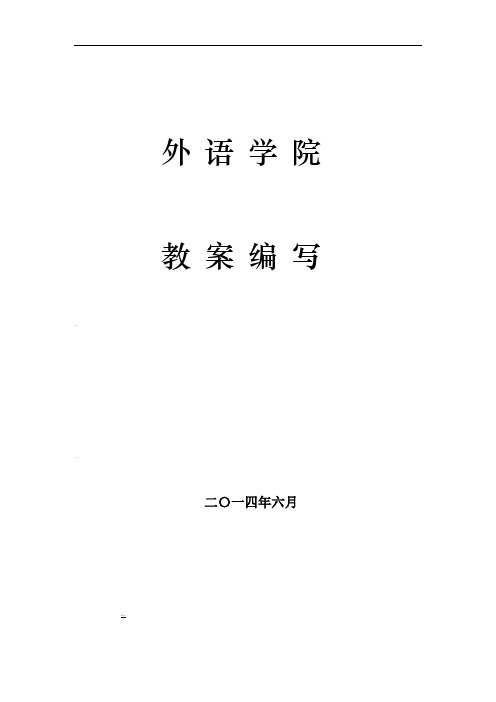
(=For a century we laboured to settle and to subdue the continent.)
`
警方设法制服了愤怒的人群。
教案(章节备课)
12学时
章节
Unit One Man and Nature
(
教学目的
和
教学要求
Learning Outcomes:
Students will be able to :
1. grasp the main idea and structure of the text;
2. appreciate the definition writing technique employed by the writer;
♦Exercise(AfterReading)
Time Allotment
@
♦Beforereading Activities1period (cultural background)
♦Global Reading2periods (Part Division of the Text;Further Understandingof the text)
|
cf. change, convert & transform
这些动词均有“变化,改变”之意。
change指任何变化,完全改变,强调与原先的情况有明显的不同。
convert指进行全部或局部改变以适应新的功能或用途。指信仰或态度时,强调较激烈、大的改变。
transform指人或物在形状、外观、形式、性质等方面发生的彻底变化,失去原状成为全新的东西。
秦秀白《新世纪大学英语综合教程(4)》(课文精解 Unit 4)【圣才出品】
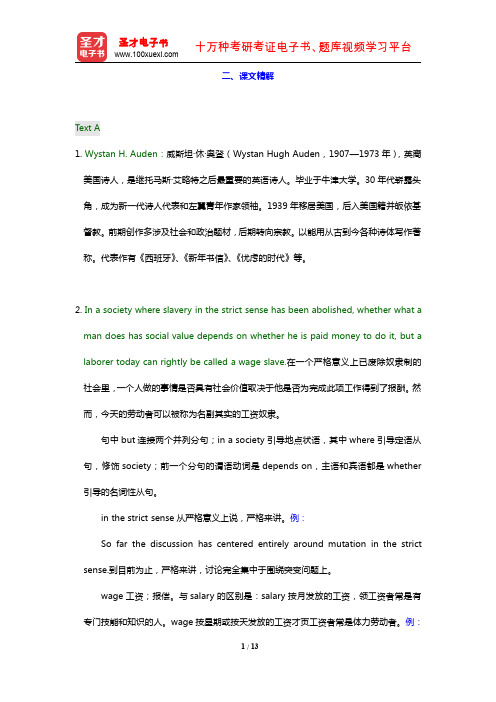
二、课文精解Text A1.Wystan H.Auden:威斯坦·休·奥登(Wystan Hugh Auden,1907—1973年),英裔美国诗人,是继托马斯·艾略特之后最重要的英语诗人。
毕业于牛津大学。
30年代崭露头角,成为新一代诗人代表和左翼青年作家领袖。
1939年移居美国,后入美国籍并皈依基督教。
前期创作多涉及社会和政治题材,后期转向宗教。
以能用从古到今各种诗体写作著称。
代表作有《西班牙》、《新年书信》、《忧虑的时代》等。
2.In a society where slavery in the strict sense has been abolished,whether what a man does has social value depends on whether he is paid money to do it,but a laborer today can rightly be called a wage slave.在一个严格意义上已废除奴隶制的社会里,一个人做的事情是否具有社会价值取决于他是否为完成此项工作得到了报酬。
然而,今天的劳动者可以被称为名副其实的工资奴隶。
句中but连接两个并列分句;in a society引导地点状语,其中where引导定语从句,修饰society;前一个分句的谓语动词是depends on,主语和宾语都是whether 引导的名词性从句。
in the strict sense从严格意义上说,严格来讲。
例:So far the discussion has centered entirely around mutation in the strict sense.到目前为止,严格来讲,讨论完全集中于围绕突变问题上。
wage工资;报偿。
与salary的区别是:salary按月发放的工资,领工资者常是有专门技能和知识的人。
新世纪大学英语综合教程第4册教案
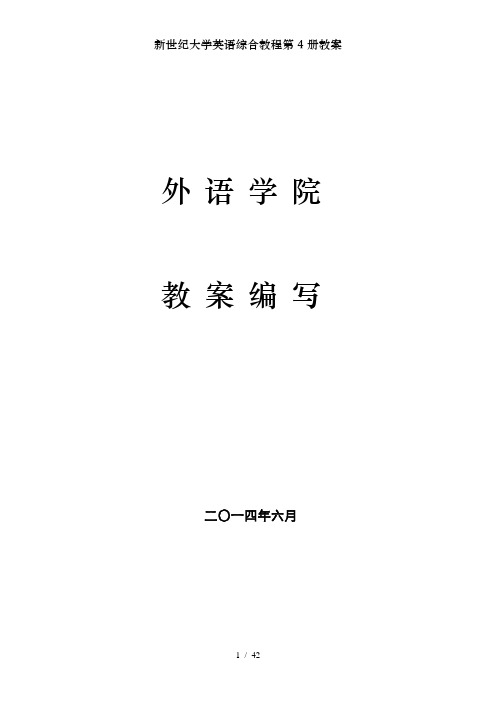
教案(章节备课)
12学时
章节
Unit One Man and Nature
教学目的
和
教学要求
Learning Outcomes:
Students will be able to :
1. grasp the main idea and structure of the text;
2. appreciate the definition writing technique employed by the writer;
Listening Course Unit 3
CET-4听力真题(2011年12月)
CET-4听力真题(2012年6月)
复习
Spoken English Test
Spoken English Test
学时
4
4
4
4
4
4
4
4
4
4
4
4
4
4
4
2
2
备注
Unit1,2、3三个单元为课堂重点讲解内容;
秦秀白《新世纪大学英语综合教程(4)》(课文精解 Unit 8)【圣才出品】
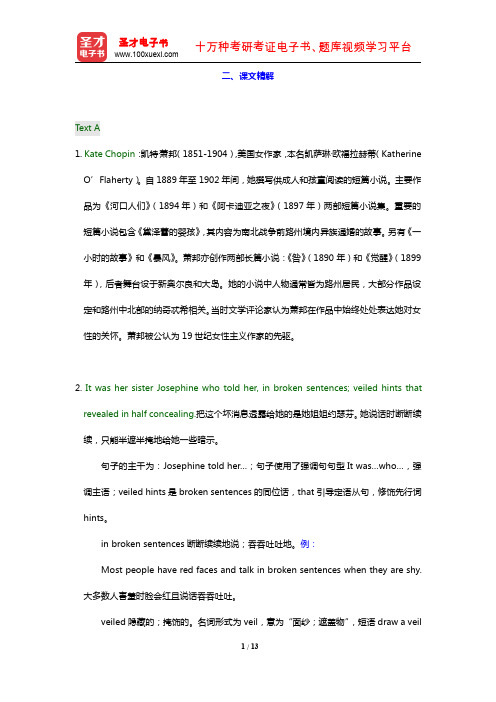
二、课文精解Text A1.Kate Chopin:凯特·萧邦(1851-1904),美国女作家,本名凯萨琳·欧福拉赫蒂(Katherine O’Flaherty)。
自1889年至1902年间,她撰写供成人和孩童阅读的短篇小说。
主要作品为《河口人们》(1894年)和《阿卡迪亚之夜》(1897年)两部短篇小说集。
重要的短篇小说包含《黛泽蕾的婴孩》,其内容为南北战争前路州境内异族通婚的故事。
另有《一小时的故事》和《暴风》。
萧邦亦创作两部长篇小说:《咎》(1890年)和《觉醒》(1899年),后者舞台设于新奥尔良和大岛。
她的小说中人物通常皆为路州居民,大部分作品设定和路州中北部的纳奇忒希相关。
当时文学评论家认为萧邦在作品中始终处处表达她对女性的关怀。
萧邦被公认为19世纪女性主义作家的先驱。
2.It was her sister Josephine who told her,in broken sentences;veiled hints that revealed in half concealing.把这个坏消息透露给她的是她姐姐约瑟芬。
她说话时断断续续,只能半遮半掩地给她一些暗示。
句子的主干为:Josephine told her…;句子使用了强调句句型It was…who…,强调主语;veiled hints是broken sentences的同位话,that引导定语从句,修饰先行词hints。
in broken sentences断断续续地说;吞吞吐吐地。
例:Most people have red faces and talk in broken sentences when they are shy.大多数人害羞时脸会红且说话吞吞吐吐。
veiled隐藏的;掩饰的。
名词形式为veil,意为“面纱;遮盖物”,短语draw a veilover sth.意为“隐瞒;避而不谈”,例:They preferred to draw a veil over the whole incident.他们宁可把这整个事件隐瞒起来。
《新世纪大学英语系列教材》案例解析
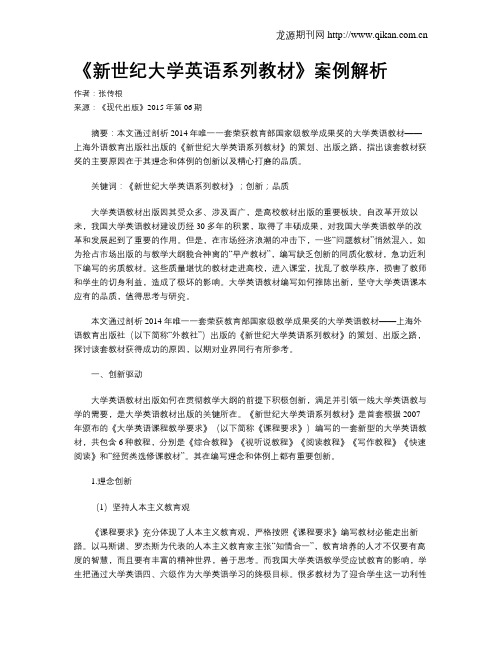
《新世纪大学英语系列教材》案例解析作者:张传根来源:《现代出版》2015年第06期摘要:本文通过剖析2014年唯一一套荣获教育部国家级教学成果奖的大学英语教材——上海外语教育出版社出版的《新世纪大学英语系列教材》的策划、出版之路,指出该套教材获奖的主要原因在于其理念和体例的创新以及精心打磨的品质。
关键词:《新世纪大学英语系列教材》;创新;品质大学英语教材出版因其受众多、涉及面广,是高校教材出版的重要板块。
自改革开放以来,我国大学英语教材建设历经30多年的积累,取得了丰硕成果,对我国大学英语教学的改革和发展起到了重要的作用。
但是,在市场经济浪潮的冲击下,一些“问题教材”悄然混入,如为抢占市场出版的与教学大纲貌合神离的“早产教材”,编写缺乏创新的同质化教材,急功近利下编写的劣质教材。
这些质量堪忧的教材走进高校,进入课堂,扰乱了教学秩序,损害了教师和学生的切身利益,造成了极坏的影响。
大学英语教材编写如何推陈出新,坚守大学英语课本应有的品质,值得思考与研究。
本文通过剖析2014年唯一一套荣获教育部国家级教学成果奖的大学英语教材——上海外语教育出版社(以下简称“外教社”)出版的《新世纪大学英语系列教材》的策划、出版之路,探讨该套教材获得成功的原因,以期对业界同行有所参考。
一、创新驱动大学英语教材出版如何在贯彻教学大纲的前提下积极创新,满足并引领一线大学英语教与学的需要,是大学英语教材出版的关键所在。
《新世纪大学英语系列教材》是首套根据2007年颁布的《大学英语课程教学要求》(以下简称《课程要求》)编写的一套新型的大学英语教材,共包含6种教程,分别是《综合教程》《视听说教程》《阅读教程》《写作教程》《快速阅读》和“经贸类选修课教材”。
其在编写理念和体例上都有重要创新。
1.理念创新(1)坚持人本主义教育观《课程要求》充分体现了人本主义教育观,严格按照《课程要求》编写教材必能走出新路。
以马斯诺、罗杰斯为代表的人本主义教育家主张“知情合一”,教育培养的人才不仅要有高度的智慧,而且要有丰富的精神世界,善于思考。
秦秀白《新世纪大学英语综合教程(4)》(第2版)学习指南【词汇短语+课文精解+全文翻译+练习答案】

秦秀白《新世纪大学英语综合教程(4)》(第2版)学习指南【词汇短语+课文精解+全文翻译+练习答案】目录Unit 1 一、词汇短语 二、课文精解 三、全文翻译 四、练习答案Unit 2 一、词汇短语 二、课文精解 三、全文翻译 四、练习答案Unit 3 一、词汇短语 二、课文精解 三、全文翻译 四、练习答案Unit 4 一、词汇短语 二、课文精解 三、全文翻译 四、练习答案Unit 5 一、词汇短语 二、课文精解 三、全文翻译 四、练习答案Unit 6 一、词汇短语 二、课文精解 三、全文翻译 四、练习答案Unit 7 一、词汇短语 二、课文精解 三、全文翻译 四、练习答案Unit 8 一、词汇短语 二、课文精解 三、全文翻译 四、练习答案弘博学习网————各类考试资料全收录内容简介本书是《新世纪大学英语综合教程(4)》(第2版)的配套辅导用书,按照原教材的课次进行编写,每单元涉及词汇短语、课文精解、全文翻译以及练习答案内容。
词汇短语中精选每单元的重、难点词汇,每个词后除了释义,还给出了相应的例句,及一些常用的搭配、词组、助记方法等。
课文精解从文中选出重点句子及难以理解的句子加以讲解,其中包括对句子结构分析、相关知识点讲解和延伸。
全文翻译是在参阅了大量与教材相关用书的基础上总结编写而成的。
练习答案提供每单元习题的参考答案。
本书旨在帮助学生更好、更高效地学习和掌握教程中的重点及难点知识,具有很强的针对性和实用性。
在编写过程中,该书力求突出重点,答疑难点,语言言简意赅,讲解深入浅出,希望它能得到广大英语学习者的喜爱和认可。
弘博学习网————各类考试资料全收录Unit 1一、词汇短语Text Arealm [relm] n. 王国,国土;领域【例句】He was banished from the realm. 他被驱逐出境。
【词组】in the realm of 在…领域里【助记】real(真正的)+m→真正的好东西(如音乐、艺术)无国界→领地,范围dweller [dwelE] n. 居住者;居民subdue [sQb5dju:] v. 征服,克服,压制【例句】We subdued a desire to laugh.我们强忍住了笑。
新世纪大学英语系列教材(第二版)综合教程1-Unit 3课后练习答案(总主编秦秀白)
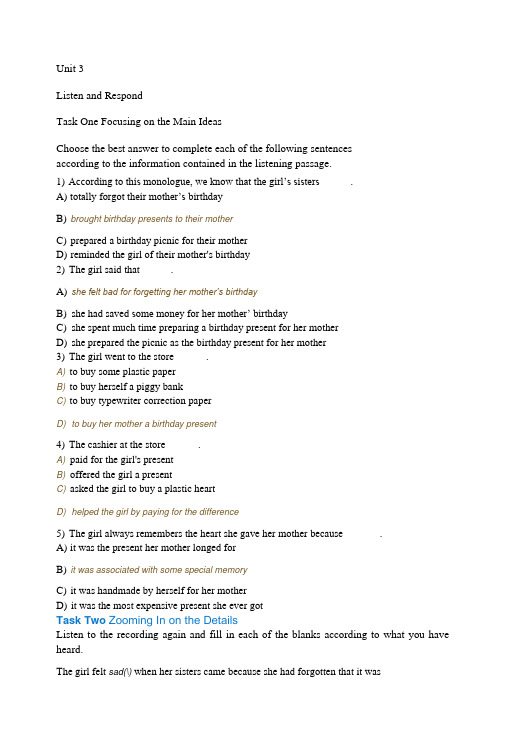
Unit 3Listen and RespondTask One Focusing on the Main IdeasChoose the best answer to complete each of the following sentencesaccording to the information contained in the listening passage.1)According to this monologue, we know that the girl’s sisters _____ .A)totally forgot their mother’s birthdayB)brought birthday presents to their motherC)prepared a birthday picnic for their motherD)reminded the girl of their mother's birthday2)The girl said that _____ .A)she felt bad for forgetting her mother’s birthdayB)she had saved some money for her mother’ birthdayC)she spent much time preparing a birthday present for her motherD)she prepared the picnic as the birthday present for her mother3)The girl went to the store _____ .A) to buy some plastic paperB) to buy herself a piggy bankC) to buy typewriter correction paperD) to buy her mother a birthday present4)The cashier at the store ______.A) paid for the girl's presentB) offered the girl a presentC) asked the girl to buy a plastic heartD) helped the girl by paying for the difference5)The girl always remembers the heart she gave her mother because ______ .A)it was the present her mother longed forB)it was associated with some special memoryC)it was handmade by herself for her motherD)it was the most expensive present she ever gotTask Two Zooming In on the DetailsListen to the recording again and fill in each of the blanks according to what you have heard.The girl felt sad(\) when her sisters came because she had forgotten that it washer mother’s birthday(2). She did not want her mother(3〕to know that, so she quickly took one dollar — the only money she had — from her piggy bank. She was sure that with this one dollar she could buy her mother a present that would show her mother how much sheloved her[A)f but when she went into a shop she found that one dollar wouldn’t buy(5) as much as she thought it would. She finally chose a plastic heart that was ninety-nine(6) cents. When she went to the cashier to make the payment, she was told that it cost more than a dollar because of the sales tax. She was so disappointed and had to put the heart back (1).Then the cashier put some of her own pennies into the cash register [Q] and gave her the heart in a bag. When the girl’s mother saw the present; she exclaimed," What a beautiful present! Its just what! need.(9〕•’ and she then put the little girl on her lap(10) and told her that she loved the heart and the girl.Task One Discovering the Main Ideas1Answer the following questions with the information contained in Text A.1)Describe in a few sentences the relationship between the writer and her mother.The writer and her mother loved each other deeply, and they were very close to each other. 2)What did the writer and her mother usually talk about under the pine tree?They usually talked about what was happening in their respective lives. They often recalled what had happened when the writer was a child. The writer also shared with her3)Why did the mother look unusually solemn one day and ask her daughter strange questions?The writer's mother acted strangely that day because her heart disease was deteriorating and she was dying.4)Did the writer visit the same place again after her mother died? What did the pine tree meanto her?Yes, she still went to the park, but now she brought her sons. The park with the pine tree was a meaningful place for the writer because it reminded her of her mother and it was a place for having more family gatherings and for maintaining a close family bond even after her mother was gone.2Text A can be divided into two parts. Now write down the paragraph numbers of each part and then give the main idea of each in one or two sentences.Part: One; Paragraph(s): 1-8; Main Idea: The writer recalls the days when she and her mother would meet and chat about life under a pine tree in the park nearby, and it was there that she learned that her mother was dying of heart disease.Part: Two; Paragraph(s): 9 - 13; Main Idea: After the writer’s mother died, the writer still brought her sons to the same spot which brought back fond memories of her mother. Such visits and the gatherings under the tree had created a close bond between her and her sons.Task Two Reading Between the Lines1Read the following statements and then decide whether each of them is true or false based on the information in the text. Write T for True and F for False in the space provided before each statement.1)F Recently, the family had picnics and gatherings quite often under the pine tree in the park (The family used to have picnics and gatherings quite often under the pine tree in the park when the writer’s mother was alive.)2)F When the writer told her mother that she was going to get married, her mother felt very sad. (Her mother cried at this news, but as she said, these were tears of joy. She was sad to see her daughter go, but happy that she had grown up.)3)TThe deepening love and close relationship between the writer and the mother grew with thepine tree.4)TThe daughter guessed that her mother was dying before her mother told her the truth.5)FThe writer's sons came to the pine tree often after their grandmother died because theirgrandmother used to take them there.(The writer’s sons still came to t he pine tree, but their grandmother did not take them there. Their grandmother had died before they were born.)6)FThe writer occasionally visited the pine tree after her mother's death because she missed hermother.(The writer went there with her sons and she shared her memories of her mother with the boys. It became a family tradition for the writer and her sons to meet under the pine tree to chat and sharenews about their lives with each other.)2Read the following sentences carefully and discuss in pairs what the author intends to say by the italicized parts.1)Mother picked up a blade of grass and began to shred it with her fingernail. I’d become wellacquainted with my mother’s habits, and this particular one indicated she had something serious on her mind. (Para. 5)/ knew my mother’s habits quite well, and this particular habit of picking up a blade of grassand shredding it with her fingernail told me that she must be bothered by something serious.2)What I didn't know, and what she had kept from me, was that her condition wasn't improving. We talked about her options, which were few... (Para. 8)We talked about possible ways of treatment that might help her to get better, but there was not much choice, for her disease was incurable and she was going to die.3)He hemmed and hawed {ox d, few minutes. (Para. 10)Fora few minutes he spoke hesitatingly and unclearly because he did not know howto break the news that he was to get married soon.4)I cried tears of joy as my son hugged me —his hug a rare and special treat. (Para. 10〕My son rarely hugged me, and when he did, it was to me like a special treat—something that gaveme great pleasure or delight.Task Three Voicing Your Views1Work in groups of threes or fours and discuss the following question. Is your relationship with your mother similar to or different from that between the writer and her mother? List as many similarities and differences as you can think of and write them down in the space provided.Similarities:a. You may also share important or minor things in your life with your mother.b. You and your mother always care about each other.c. You may also have a place which you like to visit together,e.g. a park or a square nearyour home.d•…Differences:a. You may not have a place that you frequently visit together.b. You may do more housework together.c. You may travel to different places together.d. You may not openly show your affection towards each other2List in the table below things you often do together with your parents or places you often go to with them, and share with your group members some of your pleasant / interesting / unusual experiences when doing something together with your parents.Things you often do together with your parentsgoing shopping,doing housework,going fishing, mountain-climbing, swimming, etc.Places you often go to with your parentsparks or other scenic spots, the cinema, sports fields,gyms,etc.Write a few lines here to describe your experiencessatisfied, amused,amazed, proud,excitement, pleasure, happiness, contentment, affection,and relaxation, etc.Checking Your Vocabulary • Word Detective1 Play detective and find the required word in Text B according to the clues given. Then, make at least two sentences with each of the words you have found. The number of the paragraph in which the target word appears is given in brackets.1)A verb meaning ’#to take hold of (a person or thing〕with a sudden rough movement": (Para.1)Write down the target word here: graba. A young man grabbed the money and ran away.b. They grabbed her by the arm and forced her into their car.2)An adjective meaning “suffering extreme need, anxiety, or loss of hope":〔Para. 4〕Write down the target word here: desperate a. Mary is desperate for money since she has been jobless for about 6 months.b. The project must be successful as it’s the fast desperate attempt to save the company.3)A verb meaning “to press firmly together, especially from opposite sides": (Para, 4) Write down the target word here: squeezea.Seeing her feeling so sad, he squeezed her arm sympathetically.b.Would you squeeze some oranges and make me a glass of juice ?4)A verb meaning “to set free, let go”: (Para. 6)Write down the target word here: releasea.She released the rabbit from the trap.b.Finally he released his hold on her arm.5)A verb meaning ##to ask very strongly and seriously and in a begging way”: (Para. 9) Write down the target word here: pleada.They wept and pleaded until we agreed to do as they wished.b.She pleaded for more time to pay back the money she borrowed.6)An adjective meaning “that can be easily carried or moved, quite small and light”: (Para.12)Write down the target word here: portablea.A portable machine is designed to be easily carried or moved.b.Since / need to travel a lot for work I always carry a portable computer with me.7)A noun me aning “a slight short, sharp sound1’: (Para-13)Write down the target word here: dicka.The key turned with a click and the door was open.b.A click of a button on the mouse controls the computer’s functions.8)A verb meaning “to make a search for,to try to find or get sth.”: (Para. 14)Write down the target word here: seeka. We are earnestly seeking after the truth.b. The travelers sought shelter from the rain.2 Rewrite each of the following sentences with a phrase that appears in Text B. Focus on the italicized parts. The number of the paragraph in which the target phrase appears is given in brackets.1)The train came off \^ rails and piled up in a cornfield during the snowstorm. (Para. 5)The train ran off its rails and piled up in a cornfield during the snow storm.2)On hearing the news she tried hard not to show\\er grief. (Para. 6)On hearing the news she tried hard to fight back her grief.3)Since / felt unhappy at home, I /e厅 when I was sixteen. (Para. 7)Iran away from home when / was sixteen.4)Why didn't you say you were going to be late? I’ve been extremely worried about you. (Para. 7】Why didn’t you say you were going to be late? I’ve been worried sick.5)He said he’d call again, and ended our phone talk suddenly. (Para. 13)He said he d call again, and hun^ up on me.6)For quite a while she looked at him m disbelief, shaking her head (Para. 14)She stared at him in disbelief, shaking her head.7)I stood there with a strong emotion of sorrow tried hard to fight back tears. (Para. 16) / stood there with a lump in my throat and tried hard to fight back tears.8)My mother-in-law is going to look after my son while I'm away. (Para. 17)My mother-in-law is going to take care of my son while I’m away.Checking Your Comprehension1 Answer the following questions with the information contained in Text B.1)How did the writer feel when she heard the telephone ring at midnight?She felt fear at the ringing of the telephone at midnight.2)Why did the caller say "But don’t... don’t say anything, until I finish”?Because she knew her mother very well and was afraid that her mother would start lecturingher again before hearing her out.3)What had happened to the caller?She had run away from home and found out that she was pregnant. On that particular nightshe got drunk and almost killed herself by drunk-driving.4)What was the callers complaint about her mother?She complained that her mother was not listening to her and was always telling her what she shoulddo.5)What did the caller want to do and how?The caller wanted to go back home. She called a taxi, but thought she could drive home.6)Why did the writer insist that the caller should wait for the taxi?Because the caller was drunk, the writer thought it was dangerous for her to drive home on her ownand she must wait for the taxi.7)From the end of the story, what do you learn about who actually was the caller?The caller was a stranger, not the writer’s own daughter She called the writer by mistake.8)What did the writer mean when she said “Maybe it wasn’t such a wrong number"? Althoughthe girl called the wrong number, the result turned out to be good, and the writerlearned a valuable lesson from the phone conversation and realized the importance to learn to listen when communicating with her own child. That’s why she said “it wasn’t such a wrongnumber”.9)Can you figure out the reason why the writer did not tell the caller that she had dialled the wrong number?The writer herself was a mother and she understood the runaway girl’s pain over her conflicts with her mother and her yearning to go back home and be accepted. The writer also knew clearly the critical situation the runaway girl was in. In order to keep the situation under control and not to hurt thedesperate caller, the writer did not acknowledge that the caller had dialled2The caller seemed to be facing some problems with her mother. Fill in the table below about what her mother did, how she felt about her mother and what she did finally.What the mother did1) She kept telling her daughter what should be done.2) She seemed to have all the answers rather than listen to her daughter Howthe caller felt and what she did1) she felt that her mother wasn’t listening to her.2) she felt that the mother never felt her feelings were important3) The girl finally ran away from home.3Read the following sentences carefully and try to figure out the feelings of the writer according to the context clues given in the text.1)Panicky thoughts filled my sleep-dazed mind …(Para. 1)She (the writer) felt fear at the ringing of the phone at midnight.2)1 drew in a sharp shallow breath, released my husband and pressed my hand against my forehead. (Para. 6)She was surprised and upset3)I bit into my lip, feeling my own eyes fill with moisture. (Para. 11)She was touched and felt like crying.4)“That’s good. Honey," I said, rel ief filling my chest. (Para. 18)She felt more relieved.5)“No!" I snapped. My muscles stiffened,... (Para. 20)She felt frightened at the thought of the caller driving when drunk.6)I listened to the silence in fear. When I didn't hear her answer, I bit intomy lip and closed my eyes. (Para. 23)She wasn’t feeling sure what was happening, so she felt somewhat helpless.7)Only when 1 heard someone in the background asking about a Yellow Cab did I feel my tension easing. (Para. 25)She felt relieved when she heard the taxi had arrived.8)Moving from the bed, tears forming in my eyes, I walked out into the hall and went to stand in my sixteen-year-old daughter's room. (Para. 27)She felt touched, and relieved at the same time that the situation was under control and things Enhance Your Language AwarenessWords in Action2In the box below are some of the words you have learned in this unit. Complete the following sentences with them. Change the form where necessary.1)There was a(n) aivkivard moment when she didn’t know whe ther to shake his hand or kiss his cheek.2)She breathed a sigh of re//ef when she found out she had passed her exam.3)Parents should really take extra care of their babies as many accidents actually occur at home.4)The government has two options]to reduce spending or to increase tax.5)The following program contains scenes that may be disturbing to some viewers.6)When the doctor told her that it was only a minor case, she released\\ev husband's arm.7)The woman felt panicky and she spoke almost without pausing for breath.8)The policeman blew his whistle and the protesters scattered\x\ all directions.9)He put a grape into his mouth and swallowed\\i whole.10)Don’t wipe your nose on your sleeve, kid —that’s what your handkerchiefs for!11)1 took my son to the zoo as a birthday treat.12)As I recall,it was you who suggested this idea in the first place.3In the boxes below are some of the expressions you have learned in this unit. Do you understand their meanings? Do you know how to use them in the proper context? Now check for yourself by doing the blank-filling exercise. Change the form where necessaryt1)In just a few days he became well acquainted withM his new classmates.2)Jane has locked herself up in her room for the whole day. She took us by surprise when shecame out with her hair dyed red.3)Let's sit down quietly and gather our thoughts first before the discussion.4)To my surprise, the stranger turned out to be an old friend of my mother’s.5)Seeing )im wearing a funny hat, Maggie tried hard to fight back a desire to laugh.6)Don’t hang up on me — I need to talk to you.7)After quarrelling with his step-father, Colin ran aivayand hasn’t been heard of ever since.8)They’ve hired someone Xo take care ofxhe children for a week.9)When I asked him how he was doing, he hemmed and hawed before telling me that he hadjust lost his job.10)Once a very shy boy from a small mountainous village, he turned into a competent engineerin a matter of six years.11)The newspaper refused to keep the facts from the public.12)As we sat on the beach soaking up the sunshine, she started to tell me her childhood stories. • Increasing Your Word Power1 Complete the multiple choice exercise by choosing the right answer.1)All the following verbs can form acceptable collocations with the noun RELATIONSHIP except ____ .d. make b. create c. acknowledge d. deepene. build2)All the following adjectives can form acceptable collocations with thenoun RELATIONSHIP except ___ .a. closeb. mutualc. intimated. potentiale. fluent3)All the following adjectives can form acceptable collocations with thenoun PANIC except _____ .a. blindb. suddenc. sturdy growing e. total4)All the following verbs can go with the noun PANIC except _____ .a. feelb. causec. created. spreade. throw5)All the following verbs can go with the noun RELIEF except ____ .a. seekb. createc. experienced. expresse. offer6)All the following adjectives can form acceptable collocations with thenoun RELIEF except ____ .a. deepb. sheerc. temporaryd. desperatee. obvious7)All the following verbs can go with the noun MEMORY except ___ .a. loseb. arousec. refresh d survive e. cherish8)All the following adjectives can form acceptable collocations with thenoun MEMORY except ____ .a. earlyb. sociablec. lastingd. fond e- vivid2Many words in English can be used both as nouns and as verbs. Complete all the sentences using either the noun form or the verb form of the words given in the box. Change the form where necessary •1)Please focus your minds on the following problem.2)She has constant fears that her husband will abandon (抛弃)her and the kids.3)The focus of recent research has been on environmental issues.4)Her father died of a heart attack when there was no one else at home.5)She fears that the child may have got a blood problem.6)This kind of disease attacks the central nervous system.7)She paid frequent visits to her parents and they were so happy to see her every time she visited Xhem.8)The blind man touched the elephant's ear and concluded that the elephant is in the shape ofa huge fan.9)My long chat with my mother over the phone every day has relieved a lot of my stress.10)He has got a strange skin problem. Even a light touch on his face hurts.11)The colour of the curtains and the paint on the wall do not match.12)My husband often chats with me over dinner so I know very well what is happening at his workplace.13)The young couple are a perfect match.14)Experts fearthal the disease will spread far and wide.3Did you notice the suffixes -y, -able in words such as panicky and portable in this unit? The sufilx -able can be added to a noun or a verbto form an adjective,and -y can be put after a noun to form an adjective. Now form adjectives by adding -y or -able to the words given in the table and write down the Chinese meaning for each adjective.Nouns/Verbs Suffixes Adjectives Chinese Meaningsfault faulty有错误的:有缺点的:不完善的guilt guilty有罪的:有过失的hand handy手边的;方便的panic panicky惊恐的;易恐慌的pick picky吹毛求疵的:爱挑剔的adapt -yAable adaptable能迨应新环境的:适应性强的imagine imaginable可想象的;想得到的port portable便于携带的:轻便的predict predictable可预言的;可预料的rely reliable可靠的;可信赖的Complete each of the following sentences with a proper word you have thus formed.1)He pleaded guilty to charges of theft (盗窃)and robbery in court.2)I’m sure she’ll cope with the changes very well; she’s very adaptable.3)Keep your pills handy \ust \n case you feel carsick.4)The doctor tried every means imaginable to save the patient, but in vain.5)Considering the great disparity (巷殊)in strength between the two teams, the result is predictable •6)Many people feel pan/ckyvjhen speaking before the public.7)If the product you bought turns out to he faulty •you may request a repair or a replacement8)He is such a p/cky eater that he won't eat anything but fresh vegetable.9)He's not very reliable.You'd better not count on him to help you out.10)A portable computer is a computer designed to be easily moved fromone location to another.Grammar in ContextObserve the following sentences from both Text A and Text B, paying special attention to the use of the past perfective aspect of the verb. Then do the following two tasks.Task 1: Combine each pair of sentences into one by making use of the past perfect aspect of the verb.1)a. We rushed to the railway station,b. We found the train left already.We rushed to the railway station,but found the train had left.2)a. I learnt some English at high school in China.b. I became an English Major at an American college after I finished high school in China. Before / became an English major at an American college, I had learnt some English at high3)a. I got to the cinema by bike.b. Kathy got there even earlier and picked up the tickets.Kathy had already picked up the tickets by the time / got to the cinema by bike.4)a. I shut the door.b. Immediately afterwards the telephone rang.No sooner had I shut the door than the telephone rang.or: I had no sooner shut the door than the telephone rang.5)a. The teacher explained the theory in detail,b. Then the students understood.The students did not understand until the teacher had explained the theory in detail.Task 2: A theft happened in a company last Saturday. John, the person who was on duty, was telling a friend what had happened. Imagine you are John and your partner his friend. Tell him what happened using the following clues. You need to add what is missing and make use of the past perfect aspect of verbs whenever necessary to indicate the sequence of the events.Before I left the office at 5 o'clock, I had locked the office door. When I passed by the office an hour later, 1) ! saw the door open.I felt a bit surprised; so I stopped and went in to take a look. When I saw the mess in the office, I knew 2) the office had been broken into. I took aquick look around and found that 3) quite a few things had been stolen. I called the police immediately. By the time the police arrived, my boss and my colleagues 4) had already comeback to the office.Tom said that 5) the 200 dollars he had locked in his drawer was gone.Dylan's camera, which he 6) had just bought,was also gone. My boss suffered the heaviest loss. 7) A few computers in the office had been stolen.The police searched the office, but wereunable to find any clues.ClozeComplete the following passage with words chosen from this unit. The initial letter of each is given.My mother and I always enjoyed our chat together under a pine tree in the park. At our recent {^1) meeting, however, her pale face took me by surprise(2).I asked her what was wrong, and her sad /solemn(3) look and silence mademe believe that she was keeping (4) something bad from me. Apparently,something serious was disturbing(5] her. At first, she remained silent. Finally,after my persistent inquiries(6), she could not hold it any longer and admitted(7)to me that she had a very serious heart disease. It suddenly occurred (S) to methat three years ago, she had heart surgery(9) but her condition did not improveafterwards and now there were hardly any options(10) left I reached over andwrapped my arms around my mother and cried. As we sat there thatcool April afternoon soaking(12) up the sun and smelling the fresh scent(\2) ofthe grass, I had one wish in my heart that I could have more gatherings(14] with mymother in the days to come.TranslationTranslate the following sentences into English, using the words and expressions given in brackets.1)浃们差科朋左,sj他屋尨将&么大的一磷華成;|為,^ r±o (keep sth. from, take sb. by surprise)We are good friends; however,he kept such an important matter from me,which took me by surprise.2)杏毕必典^[commencement:) i;,M慈 i.j喵於咬,,M仍迖5 <15沏水。
大学英语教材程2 秦秀白
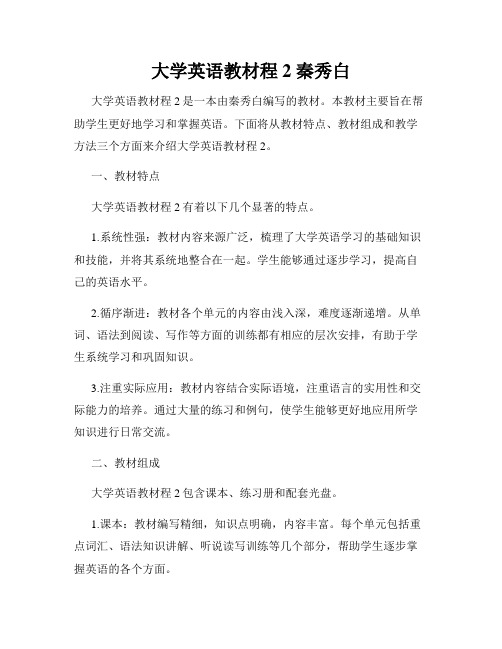
大学英语教材程2 秦秀白大学英语教材程2是一本由秦秀白编写的教材。
本教材主要旨在帮助学生更好地学习和掌握英语。
下面将从教材特点、教材组成和教学方法三个方面来介绍大学英语教材程2。
一、教材特点大学英语教材程2有着以下几个显著的特点。
1.系统性强:教材内容来源广泛,梳理了大学英语学习的基础知识和技能,并将其系统地整合在一起。
学生能够通过逐步学习,提高自己的英语水平。
2.循序渐进:教材各个单元的内容由浅入深,难度逐渐递增。
从单词、语法到阅读、写作等方面的训练都有相应的层次安排,有助于学生系统学习和巩固知识。
3.注重实际应用:教材内容结合实际语境,注重语言的实用性和交际能力的培养。
通过大量的练习和例句,使学生能够更好地应用所学知识进行日常交流。
二、教材组成大学英语教材程2包含课本、练习册和配套光盘。
1.课本:教材编写精细,知识点明确,内容丰富。
每个单元包括重点词汇、语法知识讲解、听说读写训练等几个部分,帮助学生逐步掌握英语的各个方面。
2.练习册:练习册为学生提供了大量的练习题,涵盖了课本中的各个知识点。
学生可以通过练习巩固所学的内容,提高自己的学习效果。
3.配套光盘:配套光盘提供了听力材料和口语练习的录音,学生可以通过听录音进行听力训练,同时还可以模仿光盘中的口语练习进行口语表达的练习。
三、教学方法大学英语教材程2采用了多种教学方法,帮助学生更好地掌握英语。
1.任务型学习:教材中的练习设计以任务为导向,学生需要通过完成任务来达成学习目标。
这样的学习方式可以培养学生的合作意识和解决问题的能力。
2.多媒体辅助教学:教材配套光盘提供了丰富的多媒体资源,教师可以通过利用光盘中的音频、视频等素材来进行教学,使学生更好地理解和掌握所学内容。
3.情景教学:教材中的例句和对话贴近日常生活,通过情景设置,帮助学生更好地理解和运用所学知识。
同时,情景教学也能够增加学生的兴趣和参与度。
总结:大学英语教材程2是一本以提高学生英语水平为目标的教材。
从模因论看大学英语写作教学回归传统的背诵和仿写
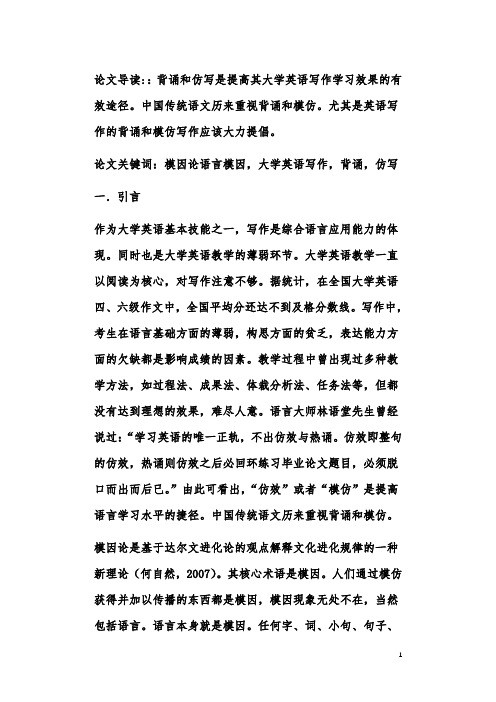
论文导读::背诵和仿写是提高其大学英语写作学习效果的有效途径。
中国传统语文历来重视背诵和模仿。
尤其是英语写作的背诵和模仿写作应该大力提倡。
论文关键词:模因论语言模因,大学英语写作,背诵,仿写一.引言作为大学英语基本技能之一,写作是综合语言应用能力的体现。
同时也是大学英语教学的薄弱环节。
大学英语教学一直以阅读为核心,对写作注意不够。
据统计,在全国大学英语四、六级作文中,全国平均分还达不到及格分数线。
写作中,考生在语言基础方面的薄弱,构思方面的贫乏,表达能力方面的欠缺都是影响成绩的因素。
教学过程中曾出现过多种教学方法,如过程法、成果法、体裁分析法、任务法等,但都没有达到理想的效果,难尽人意。
语言大师林语堂先生曾经说过:“学习英语的唯一正轨,不出仿效与热诵。
仿效即整句的仿效,热诵则仿效之后必回环练习毕业论文题目,必须脱口而出而后已。
”由此可看出,“仿效”或者“模仿”是提高语言学习水平的捷径。
中国传统语文历来重视背诵和模仿。
模因论是基于达尔文进化论的观点解释文化进化规律的一种新理论(何自然,2007)。
其核心术语是模因。
人们通过模仿获得并加以传播的东西都是模因,模因现象无处不在,当然包括语言。
语言本身就是模因。
任何字、词、小句、句子、段落和篇章都可以成为模因,但前提是通过模仿得到复制和传播。
因此,把语言模因应用于写作教学中,利用模因复制和传播的特点,可以让学生在模仿的基础上提高英语写作能力。
二.语言模因论概述模因论(memetics)最早在著名动物学家和行为生态学家Richard Dawkins(1976)所著的《自私的基因》(The Selfish Gene)中首次提出,意为“被模仿的东西”。
他认为,在达尔文主义世界里,除了基因(gene)外,还存在另外一种复制因子,取名为“模因”免费论文下载。
基因是通过遗传而繁衍,而模因是通过模仿而传播,是文化的基本单位(何自然,2005)。
根据《牛津英语词典》,模因meme被定义为:“文化的基本单位,通过非遗传的方式,特别是模仿而得到传递。
新世纪大学英语综合教程1 - 单元话题作文范文(秦秀白版)
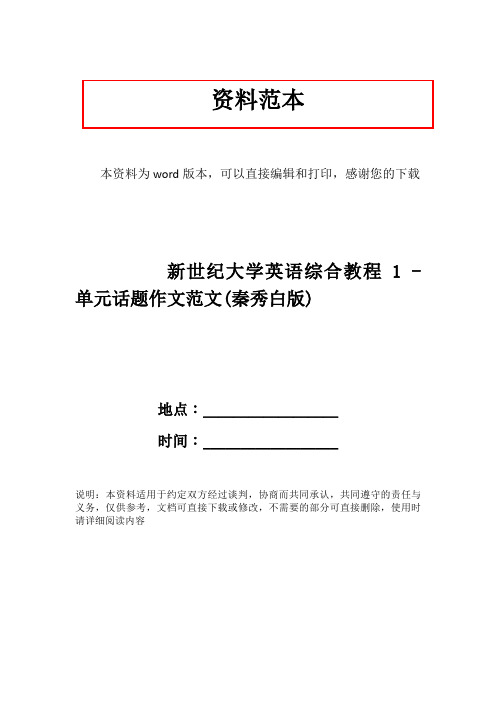
资料范本本资料为word版本,可以直接编辑和打印,感谢您的下载新世纪大学英语综合教程 1 - 单元话题作文范文(秦秀白版)地点:__________________时间:__________________说明:本资料适用于约定双方经过谈判,协商而共同承认,共同遵守的责任与义务,仅供参考,文档可直接下载或修改,不需要的部分可直接删除,使用时请详细阅读内容Unit 1 College life1. Write an essay in about 100–120 words based on yourdiscussion in Optional Classroom Activities. You can take either of the following titles:1) I like to study on my own2) I like to study in a group2. If you didn’t do Task 3 in Optional Classroom Activities you can write an essay of around 120 words on the following topic.College Is Not an Ivory Tower▆ Sample Essays for Task 1:I like to study on my ownMany of my classmates like to study together. However, I always like to study on my own, with good reasons. First, I feel that I can concentrate better when I study alone. When I have to work together with other people, I often get distracted and more often than not, I end up chatting with them without completing the task at hand. Second, when I study on my own, I can work at my own pace, choosing to spend more time on certain difficult sections and less time on less challenging parts. I can also check my class notes or reference books whenever I feel the need to. One final good advantage of studying alone is that unlike group work, self study is not restricted by time and space. In other words, if I feel like studying, I can do so atany time and anywhere. (146 words)I like to study in a groupAccording to a recent study, students who study together by discussing homework and problems usually score higher than those who work on their own. I am happy to hear that because I like to study ina group. I think we can reinforce our understanding of what we have learned in class by asking each other questions. Besides, it is always enjoyable working with someone else. A discussion on questions we don’t und erstand very well will help clear up any possible confusion. Last but not least, we should not ignore the importance of cooperation in our society. Working with others helps develop our team spirit, which has become essential in this modern world of ours. After all, two heads are always better than one. (125 words) ▆ Sample Essay for Task 2:College Is Not an Ivory TowerPeople often say that college is an ivory tower and life on campus is cut off from the harsh realities of the real world. College may have been an ivory tower before, but it is not so any more. We college students are under various kinds of pressure. First of all, most of us are burdened with a heavy tuition fee, which keeps on increasing every year. So some of us have to work over ten hours every week. Life for those who can get financial help from their parents is not easy either, as they very often have to follow their parents’ advice and take a major they don’t like. Finally those who are about to graduate suffer from a different kind of pressure: hunting for a job. It is no longer easy for a college student to get a decently paid job these days. (134 words)Unit 2 Learning a language▆ Write a passage in about 100-120 words, taking either of the following titles:1) Why I like to learn English2) Why I hate to learn English▆ Sample essay for Task 1:Why I like to learn EnglishI have learned English for about seven years. I should say that I am highly motivated to master English. First of all, learning English is useful, as it is becoming a world language and people from different countries often communicate with one another in English. If I am good at English, it will be much easier for me to communicate with them. Secondly, I like traveling a lot. A good mastery of English will make things much easier for me when traveling around the world. Finally, I like literature a lot. If I am very good at English, I can read great works by Shakespeare and Dickens and many other English writers instead of reading the translated versions.▆ Sample essay for Task 2:Why I hate to learn EnglishI have learned English for about seven years. I should say the more I learn English, the more I hate it. First of all, learning English is boring. I have to memorize many new words or rely on a dictionary to frequently check unknown words. Doing so wastes a lot of my precious time. Secondly, I don’t understand why we have to learn a foreign language. I don’t want to go abroad and I can always find a job that doesn’t need English in China. Finally, I can always r ead translated versions of the books I want to read. So, if I don’t have to learn English, I would rather use the time I spend on English to do things I like.Unit 3 Parents and ChildrenIn about 100-120 words, write about an incident of misunderstanding between you and your mother/father. Tell us about how it all started and what happened in the end.In about 100-120 words, describe the similarities and differences in the way your father and mother show their love for you . Be sure to give examples.▆ Sam ple essay for Task 1A misunderstanding between my mother and IOne afternoon, I was wandering along the main street of our small town with a friend. Suddenly I saw my mother. She was behaving very strangely. She looked around her before going quickly into a shop. When she came out, she had a box in her hand. I was terrified. I knew some of my villagers resorted to theft because they were poor. The thought that my mother could be one of them drove me crazy. I was determined to find out the truth from her. When I questioned her, tears filled her eyes. She told me she was collecting beer cans from some kind shop owners who offered them to her, but would feel embarrassed if she was seen by others. I cried and hugged her andfelt sorry that I had misunderstood my own mother.▆ Sample essay for Task 2:My parents’ loveMy parents differ greatly in showing their love for me. While my mother appears more anxious and depressed if anything goes wrong with me, my father tends to be silent and expresses his concern for me mainly through actions rather than words. I still remember the day when I left home for university. When my mother was in tears and kept giving me endless advice, my father remained silent. But when he saw an ice-cream man on the platform, he rushed towards him and got me an ice-cream just before the train started to move. I learned from my mother later that my father locked himself up in his room after returning home and cried for the first time in his life. I neverexpected that my departure would trigger such an emotional response from my father.Unit 4 Growing up1. In about 100-120 words, write about a conflict you once had with your parents .You can start with either of the following openings:1) I was very unhappy with my mother/father the other day…2) I was grateful that my mother/father criticised me the other day…2.Describe your attitude toward your father or mother when you were a teenger. When you could not agree with each other, what did you do? Use an incident from daily life to support the description.▆ Sample essay for Task 1:I was very unhappy with my mother /father the other day. . .I was very unhappy with my father the other day. He must have called out to me for help with some housework, but I was so absorbed in reading that I did not hear him. He stepped into my room , apparently in anger, grabbed my book and threw it on the floor. I got upset and insisted he should pick it up and apologize to me. When he remained silent, I ran out and went off to play games with friends in the neighbourhood. When it was turning dark, I saw my father looking for me. He patted me on the head walked back home with me, his arm wrapped around my shoulder. When I got home, I saw my book had "returned" to my reading table.▆ Sample essay for Task 2:I was very grateful that my mother /father criticised the other day. . .I was grateful that my mother criticised me the other day. I had been asking her for money to buy all kinds of things that my friends have--a new pair of shoes or some new clothes. Every time I was refused, I played the same trick -- threatening to pour the dish she cooked for the family into the river. My mother gave in each time I threatened to do that, but one day, she criticised me really hard. She scolded me for being selfish and inconsiderate and asked me tosit in a corner and reflect on my own behavior. I could not believe my mother could be so angry with me and I grew afraid. I learned a good lesson and changed a lot afterwards. I was thankful that my mother made me realize my mistakes.▆ Sample essay for Task 2:I was so proud of my fatherMy father is a well-known carpenter in my village. I still remember that when I was in my mid-teens, I used to adore him make furniture for the villagers. He not only had good skills, but he was also willing to help the villagers with minor repairs such as mending a broken window frame or fixing a door, without charge. All the villagers respected him. They also paid me compliments when they saw me helping him , saying that I would grow up to become honest and industrious just like my father. I was so proud that I had a father who was so well respected.Unit 5 Knowing YourselfWrite a passage of about 100-120 words according to one of the instructions given below.1) Describe a few of your own personality traits. Then identify your favourite colour and see if the descriptions of the colour in Text B match your personality.2) Think of the person you admire most. Write two personality traits that you like most about this person. Remember to give an example for each personality trait.3) Imagine that you had been given a wish to change your life. Write about two personality traits that you would like to have and give your reasons.4) Write about a person whom you dislike most and give one or two reasons or examples why you dislike him or her so much.▆Sample essay 1)I have been described by many friends as a warm, sociable, and outgoing extravert. I find it easy to make new friends and I enjoy the company of people who share similar characteristics as I. When I am at a party, many people including those I do not know, will talk to me. I am not a great beauty, neither am I rich and intelligent. In fact, I am just a very simple person who is happy and smiles a lot. Maybe being happy is the attraction. I like bright colours,especially red. It is said that people who like red are passionate and have a lot of energy. I agree that I am enthusiastic about many things and like doing many things at the same time. So it seems there is some truth after all in what colours say about a person’s personality.▆Sample essay 2)The person I admire most is my father’s youngest brother. He is known to us as ba shu because he is the eighth son in a family of eleven. He is a high achiever. Since young, he has done well in his studies and work. For example, he received a prestigious scholarship to study at a well-known medical school in England. Today, at the age of 62, he is still as outgoing. He is a well-respected surgeon andhas won many awards. What I like most about ba shu is his sensitive nature, especially toward children who are born unlucky. He has volunteered his time and made sacrifices to help those in poor and developing countries. His strong desire to bring happiness to these people has impress me a lot.▆Sa mple essay 3)If I were given a wish to have two personality traits, I would choose to be an optimistic person because those who are optimistic are usually satisfied and content with what they have. They seldomlet sadness be a part of their life. I want to be happy and being optimistic is one way to remain happy. I also would like to be creative. I think that creativity is inherited. Some may disagree and say that we can learn to be creative. However, no matter how hard one learns, it is those born with the talent of creativity who will make a great name for themselves like the famous poet Li Bai and the richest man in the world, Bill Gates.▆Sample essay 4)There is no one person I disagree most but there are a couple of personality traits that I cannot tolerate: aggressiveness and selfishness. Aggressive people do not consider other’s feelings and will not think twice about hurting even those closest to them. I once had a neighbour who would beat his wife one day and appear loving the next. His wife lived in fear constantly but could do nothing because he was in control of her. Another personality trait I dislike is selfishness. Like aggressive people, selfish people only think of themselves. There are many everyday examples of selfishness such as those not willing to lend things to others and those not wanting to share exam tips even with their best friends. If you know someonewith a combination of aggressiveness and selfishness, you should consider whether to call him or her a friend.。
新世纪大学英语综合教程课件 秦秀白主编 第4册U7B4
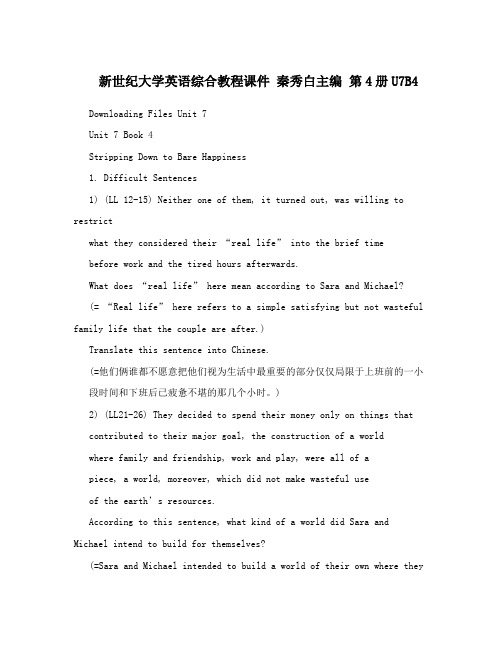
新世纪大学英语综合教程课件秦秀白主编第4册U7B4 Downloading Files Unit 7Unit 7 Book 4Stripping Down to Bare Happiness1. Difficult Sentences1) (LL 12-15) Neither one of them, it turned out, was willing to restrictwhat they considered their “real life” into the brief timebefore work and the tired hours afterwards.What does “real life” here mean according to Sara and Michael?(= “Real life” here refers to a simple satisfying but not wasteful family life that the couple are after.)Translate this sentence into Chinese.(=他们俩谁都不愿意把他们视为生活中最重要的部分仅仅局限于上班前的一小段时间和下班后已疲惫不堪的那几个小时。
)2) (LL21-26) They decided to spend their money only on things thatcontributed to their major goal, the construction of a worldwhere family and friendship, work and play, were all of apiece, a world, moreover, which did not make wasteful useof the earth’s resources.According to this sentence, what kind of a world did Sara andMichael intend to build for themselves?(=Sara and Michael intended to build a world of their own where theycould enjoy family life, social life and balance work and play all at thesame time. Meanwhile, they wished to construct a world which did not make wasteful use of the earth’s resources.)Analyze the structure of this sentence.(=本句的主句是They decide to spend their money on things,后面携带的that从句是先行词things的定语从句,而在定语从句中又嵌套了分别以where和which引导的定语从句,修饰the construction of a world中的world 一词,而短语the construction of a world其成分实际上是短语major goal 的同位语。
大学英语教学设计--以《新视野大学英语》为例
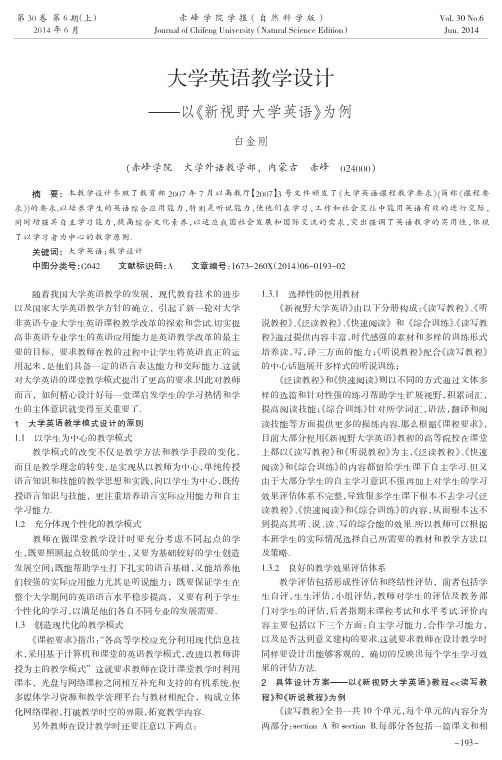
随着我国大学英语教学的发展,现代教育技术的进步以及国家大学英语教学方针的确立,引起了新一轮对大学非英语专业大学生英语课程教学改革的探索和尝试.切实提高非英语专业学生的英语应用能力是英语教学改革的最主要的目标,要求教师在教的过程中让学生将英语真正的运用起来,是他们具备一定的语言表达能力和交际能力.这就对大学英语的课堂教学模式提出了更高的要求.因此对教师而言,如何精心设计好每一堂课启发学生的学习热情和学生的主体意识就变得至关重要了.1大学英语教学模式设计的原则1.1 以学生为中心的教学模式教学模式的改变不仅是教学方法和教学手段的变化,而且是教学理念的转变,是实现从以教师为中心,单纯传授语言知识和技能的教学思想和实践,向以学生为中心,既传授语言知识与技能,更注重培养语言实际应用能力和自主学习能力.1.2 充分体现个性化的教学模式教师在做课堂教学设计时要充分考虑不同起点的学生,既要照顾起点较低的学生,又要为基础较好的学生创造发展空间;既能帮助学生打下扎实的语言基础,又能培养他们较强的实际应用能力尤其是听说能力;既要保证学生在整个大学期间的英语语言水平稳步提高,又要有利于学生个性化的学习,以满足他们各自不同专业的发展需要.1.3 创造现代化的教学模式《课程要求》指出:“各高等学校应充分利用现代信息技术,采用基于计算机和课堂的英语教学模式,改进以教师讲授为主的教学模式”这就要求教师在设计课堂教学时利用课本,光盘与网络课程之间相互补充和支持的有机系统.使多媒体学习资源和教学管理平台与教材相配合,构成立体化网络课程,打破教学时空的界限,拓宽教学内容. 另外教师在设计教学时还要注意以下两点:1.3.1 选择性的使用教材《新视野大学英语》由以下分册构成:《读写教程》、《听说教程》、《泛读教程》、《快速阅读》和《综合训练》.《读写教程》通过提供内容丰富,时代感强的素材和多样的训练形式培养读,写,译三方面的能力;《听说教程》配合《读写教程》的中心话题展开多样式的听说训练;《泛读教程》和《快速阅读》则以不同的方式通过文体多样的选篇和针对性强的练习帮助学生扩展视野,积累词汇,提高阅读技能;《综合训练》针对所学词汇,语法,翻译和阅读技能等方面提供更多的操练内容.那么根据《课程要求》,目前大部分使用《新视野大学英语》教程的高等院校在课堂上都以《读写教程》和《听说教程》为主,《泛读教程》、《快速阅读》和《综合训练》的内容都留给学生课下自主学习.但又由于大部分学生的自主学习意识不强再加上对学生的学习效果评估体系不完整,导致很多学生课下根本不去学习《泛读教程》、《快速阅读》和《综合训练》的内容,从而根本达不到提高其听、说、读、写的综合能的效果.所以教师可以根据本班学生的实际情况选择自己所需要的教材和教学方法以及策略.1.3.2 良好的教学效果评估体系教学评估包括形成性评估和终结性评估,前者包括学生自评,生生评估,小组评估,教师对学生的评估及教务部门对学生的评估,后者指期末课程考试和水平考试.评价内容主要包括以下三个方面:自主学习能力,合作学习能力,以及是否达到意义建构的要求.这就要求教师在设计教学时同样要设计出能够客观的,确切的反映出每个学生学习效果的评估方法.2具体设计方案———以《新视野大学英语》教程<<读写教程》和《听说教程》为例《读写教程》全书一共10个单元,每个单元的内容分为两部分:section A 和section B.每部分各包括一篇课文和相Vol. 30 No.6Jun. 2014赤峰学院学报(自然科学版)Journal of Chifeng University (Natural Science Edition )第30卷第6期(上)2014年6月大学英语教学设计———以《新视野大学英语》为例白金刚(赤峰学院大学外语教学部,内蒙古赤峰024000)摘要:本教学设计参照了教育部2007年7月以高教厅【2007】3号文件颁发了《大学英语课程教学要求》(简称《课程要求》)的要求,以培养学生的英语综合应用能力,特别是听说能力,使他们在学习,工作和社会交往中能用英语有效的进行交际,同时增强其自主学习能力,提高综合文化素养,以适应我国社会发展和国际交流的需求,突出强调了英语教学的实用性,体现了以学习者为中心的教学原则.关键词:大学英语;教学设计中图分类号:G642 文献标识码:A 文章编号:1673-260X (2014)06-0193-02193--关的联系.Section A的练习包括:pre-reading activities, comprehension of the Text, Vocabulary , Sentence Structure, Translation, Cloze, Text Structured Analysis, 和Structured Writing.Section B的练习包括:Reading Skills, Comprehension of the Text, Vocabulary.每一单元的pre-reading的练习其实是我们教学实践中的热身环节(warming-up).大学英语的课本的warming-up这一环节的练习主要针对训练学生的听说能力.这一部分练习的具体内容是让学生听一段小短文,然后回答几个问题,最后就这一段针对的问题进行讨论.根据教学大纲教师首先放第一遍听力的时候学生只要求听出这段话的主旨大意,听第二遍的时候要求回答两个问题.在设计这个环节的时候教师为了照顾听力水平差的同学在时间允许的情况下可以重复多播放两遍,为了让学生听得更清楚,教师甚至可以逐句逐句的播放.学生只有在听明白内容的情况下才能够就某个话题展开讨论.在讨论环节教师尽量让学生张开嘴,多表达,说不成句没关系哪怕是几个单词也可以,教师就学生在口语中犯得错误没必要直接纠正,比较好的一个办法是教师就学生说得出现错误的这句话,用正确的方式加以重复,学生自然而然就会知道自己哪里用错了词或是犯了什么语法错误.这样的听说结合练习不仅使学生对自己的听力和口语表达能力有了信心,也会增强他们对英语学习的兴趣.Comprehension of the Text,这一部分是由一篇700w组成的文章和八个相关的问题组成.英语阅读课的设计一般分两种课型,精读和泛读.Comprehension of the Text这一部分属于精读.精读可以根据学生的情况分三个步骤完成.首先教师可以播放一遍该课文的录音,学生在听得同时掌握课文的主旨大意,第二遍阅读由学生自己完成,目标是通过第二次阅读能够很好的回答课后相关的八个问题.是否能够通过阅读文章回答这八个问题对是否能够理解全文起着至关重要的作用.所以在这个环节教师可以建议英语基础差的同学课前做相关的预习.比如,查一查陌生的单词或者是一些语法方面的内容,这样就能够保证所有的学生能在规定的时间内完成任务.当然对这一部分的学习教师也要做好充分的准备,要尽量推测出对不同层次的学生来说课文中出现的难点.以便在讲解时能够照顾到所有学生.Vocabulary这一部分的内容主要是每牌篇课文中所出现的生词以及词组.在设计这一部分的教学内容时,教师不要急于让学生记住每个单词的意思,事实上学生一时半会儿也记不住那么多生词,我的建议是首先让学生会读这些单词,我所说的会读是指学生能够准确的掌握每个单词的发音.首先学生可以听一遍录音,再跟着录音读一遍,最好教师再领着同学们读一遍,以防有些学生听力能力差跟不上录音的节奏.最后教师可以分组让学生一起读甚至可以挑出及个别几个发音标准的同学起来做示范.英语是一门语言,所以在学习的过程中,“说”占据着非常大的空间,那么在学习单词是的“说”就是把每个单词能够准确的读出来.在这个基础上再进行“记”就比较容易了.在课堂上还需要进行设计的就是Text Structured Analysis和Structured Writing这两个板块.结构分析和写作两者互为依托,相辅相成.结构分析部分教师对课文中某一个或几个段落进行分析,指出篇章结构的特点,再让学生从课文中选出结构相仿的段落进行分析.在写作部分,根据已分析的篇章结构特点,教师可以给出一篇样段供学生参考,在此基础上可以让学生根据提纲进行相关的段落写作,以便逐步提高学生的写作能力.Sentence Structure, Translation, Cloze这几部分都是和这一单元所学的内容相结合的练习,教师可以以作业的形式留给学生课下完成,但是一定要做好监督检查工作.我的建议是教师可以把学生分为若干组,每个组选出一位组长来近距离的监督检查组员是否完成了课后内容.Section B这一分主要针对的是阅读技能的介绍和操练,属于学生自学部分,但是在时间允许的情况下,教师可以引导学生结合前面Comprehension of the Text的课文里介绍的阅读技能,通过Section B里面的课文的练习进行有针对性的阅读技能训练.《听说教程》教程的内容是配合读写教程的中心话题展开多种形式的听说训练.所以教师在完成《读写教程》的每个单元的教学内容以后一定要抽出一节课的时间就《听说教程》的相关内容作做选择性的听说训练.比如每个单元Homework这个板块为学生自学内容,包括绕口梁,名言名句诵读,经典演讲,补充听力材料以及VOA慢速新闻等.最后的Oral Report旨在扩展单元主题,提供更多视角,培养学生完成口头报告的能力.教师可以利用该板块培养学生的自主学习能力.对于Oral Report,建议教师对完成Presentation 的各个环节进行适当的指导,例如,如何收集材料,如何论证观点,如何进行演示等.在这个环节里仍然可以引导学生进行合作学习,也可以鼓励他们相互评审,使学生乐于参与这项活动,而不是变为课外的负担.3结语总之,成功的英语教学离不开精心的课堂设计遵循当代大学英语教学的思维模式,正确地引导,激发学生;优化教学过程;满足学生的发展需求;及时进行课堂教学评价;提高大学英语课堂教学效果是所有大学英语教学者不断追求和探索的目标.———————————————————参考文献:〔1〕郑树棠.新视野大学英语———《读写教程》(第二版)[M].外语教学与研究出版社,2011.〔2〕郑树棠.新视野大学英语———《听说教程》(第二版)[M].外语教学与研究出版社,2011.194 --。
- 1、下载文档前请自行甄别文档内容的完整性,平台不提供额外的编辑、内容补充、找答案等附加服务。
- 2、"仅部分预览"的文档,不可在线预览部分如存在完整性等问题,可反馈申请退款(可完整预览的文档不适用该条件!)。
- 3、如文档侵犯您的权益,请联系客服反馈,我们会尽快为您处理(人工客服工作时间:9:00-18:30)。
遵义师范学院
【 摘 要 】大 学 英 语 导 学 课 在 学 生英 语 学 习过 程 中起 着 至 关 重 要 的作 用 。 本 文 以 秦 秀 白 主 编 的 《新 世 纪 大 学
现丰富 的词汇 与语用知识 、多角度文化观念及 习俗 的解 读 与 认 知 ,有 利 于 提 高 对 事 物 认 识 、 智 力 水 平 、反 应 能 力 和 世 界 性 常 识 的 了解 。据 个 人 兴 趣 爱 好选 择 不 同题 材 , 了解不 同风格 的文章 ,提升个 人对他人及事物 的社会态 度、交际动机 、个人品质和习惯等的影 响。 ( 3 )学 习策 略 。 学 习策 略对 语 言 学 习 同样 具 有 重 要 的意义 。报刊 阅读有助于培 养学习策略 。具体包 括认知 策略 、元认知 策略、情感策 略和 社交策略等 。例 如认知 策 略 是 感 知 、 加 工 、理 解 、 记 忆 、 提 取 信 息 时使 用 的 方 法 系 统 。在 报 刊 学 习过 程 中 , 学 生 使 用 字 典 、 网 络 , 重 复或默读 句子 ; 根据 单词意义 分类 ,利用 图像理解 ,在 大脑 中回忆再现 单词,把新 旧知识相连 ;利用 已有的信 息猜词 ,做笔 记,对阅读 的内容作小结 ,用不 同的方法 整合 信 息与 句 型 ; 中 英 文翻 译 等 。
有 明 显 差 异 。 实验 后 两 个 班 级 口 语 测 试 结 果 流 利 程 度 变
0 3 3 、语 法 . 0 4 3 。
大学英 语 课程
化 发 音 明 显 , P 值 为 . 0 2 3 , 变 化 依 次 为 准 确 度 . 0 3 1 、 词 汇 . 0 3 2 、
.
导学模式探究
口 结 论
■U
口 大 学 英 语 教 学 目 标 的 导 入
《 大 学 英语 课 程 教 学 要 求 》 中 提 出 , “ 大 学英 语 的教 目标是培养学生的英语 综合应用能力 ,特别是听说能力, 使他们在今后学习、工作和社会交往中能用英语有效地 行交际 ,同时增强其 自主 学习能力 ,提高综合文化素养, 以适应我 国社会发展和 国际交流 的需要 。 ”大 学英语教 中应体现 “ 学生在学习过程 中的主体地位和教师在教学 程 中的主导我们教师提 出了一个新课题。由于大学英 课程有别于其它专业课程 ,而且要求达到的 目标又是全力 位 的 。 因此 ,我们 老 师在 新 生 的第 一 堂 课应 有 一 个清 晰 教 学 思路 和 明确 的教 学 目标 ,让新 生 尽 快适 应 大 学全 新 教 学模 式 ,尽早 转 变 观念 ,积 极配 合 教 师 的教 学 计划 ,主 动 学 习 , 自主 学 习 ,培养 良好 的 学 习习 惯 。教 师 的 第一 董 课 应 对整 个 大 学英 语 课程 进 行 一个 全 面 的介 绍 ,包括 教 学 目标、课程性质 、评价方式、学习习惯、任务分配等,假 学生对所学课程有一个总体 了解。
——以紊秀自主编 《 新世纪大学英语 》教本 才 为
口 杨 维琴 彭 廉
目 结 果 与 讨 论 ( 1 ) 语 言 知 识。 根 据 实 验 结果 可以 推 断 实 验 班 语言
知识 ( 昕 读 写 译 )提 高 程 度 明 显 高 于 控 制 班 。 以 词 汇 为
例, 实验班在读报中 重视常用词汇的搭配、 辨异、文化
v 3 o 1 c 、 a . b 6 u 5 l 4 a r 、 y . 6 / p 1 r 2 o ( n > u 0 n . c 0 i 5 a t ) i , o n 说 血 明 个 在 万 实 向 验 , P 前 值 两 分 个 别 班 为 级 . 5 口 5 语 l 、 . 基 7 5 本 2 、 没 . 7
大学 英语是高等教育 的一个重要组成部 分,是大尊 生 必 修 的 一 门公 共 基 础 课 , 同 时 也 是 评 估 高 校 教 学 质 量 好坏 的重要标尺 。我们认 为大学英语课程 的导学对学 学习的积极性和学 习效果起着不可估量 的作 用。下面 新 世纪 大学英 语系 列教材 ( 主编 : 秦 秀 白、张怀 建等 为 例 ,深 入 探 讨 导 学模 式 的 实 施 和 达 到 的 效果 。
本 实 验 通 过 研 究 表 明 :英 语 报 刊 有 助 于 提 高 英 语 语 言综合运用 能力 。英语综合运用能力的提高不是孤立 的, 充分利用 英文报刊对语 言素养 、多元文化认 识、公民素 养、新闻素养 、职业道德和科学 素养的引领与培养 ,丰 富课 内课外活 动,强化语 言实践 ,使语言知识 与技能培 养更具体 、更 实用、更具有可操 作性。英 国著名语 言学 家斯威特认为一个好的教学模式应该是折中的、综合 的。 英语报刊教 学为 提高英语综合运 用能力提供 了很好 的实 践平台与备课 资源 。本课题研 宄不仅 推动我 院英 语教学 改 革 , 同时 为 高 职 高 专 英 语 教 改 起 到 积 极 的 推 动 示 范 作 用 。 参考 文 献
内涵 ,提 高认 知 和 灵 活 运 用 能 力 。 在 不 同语 篇 中 学 习 和 记 忆 词 汇 , 提 高 学 习效 率 。 同 时 结 合 语 境 , 了解 文 化 内 涵 ,掌 握 词汇 含 义 ,进 而 有 效 交 际 。通 过 直 观 、 情 景 性 和 趣 味 性 的活 动 ,创 设 具 体 语 境 , 加 深 词 汇 理 解 运 用 , 进 而 提 高 语 言表 达 能力 。 ( 2 ) 交 际 能 力 。高 职 英 语 强 调 语 言 综 合 运 用 能 力 尤 其 是 交 际 能 力 。交 际 能 力 内 涵 复 杂 , 涉 及 语 言 、 修 辞 、 文 化 、社 会 、 心 理 、情 感 等 多 方 面 。 报 刊 教 学 , 主 要 体
语 》系列教材为例 ,从大学英语教 学 目标 、学生 的学 习 观 念 、 学 习方 法 、教 材 内容 等 各 个 方 面 探 索 大 学 英 语 课 程导学模式。通过 “ 导 学 ” ,使 学 生尽 快进 入 良好 的 龚 语 学习状 态,从而达到事半 功倍 的效果。 【 关键词】 大学英语课程 ;导学;教学模式 【 中图 分 类 号 】 H3 1 9 f 文 献标 识 码】 A 【 文章编号】 1 0 0 9 . 6 1 6 7 ( 2 0 1 3 ) 0 6 — 0 1 0 0 — 0 2
